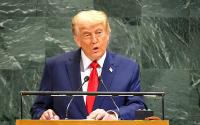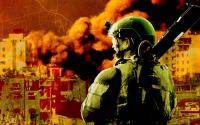US Church Alliance: Washington is 'Raining Down Terror' with Iraq War, Other Policies
Common Dreams / Published on Sunday, February 19, 2006 by the Associated PressBrian Murphy
A coalition of American churches sharply denounced the U.S.-led war in Iraq on Saturday, accusing Washington of "raining down terror" and apologizing to other countries for "the violence, degradation and poverty our nation has sown."
The statement, issued at the largest gathering of Christian churches in nearly a decade, also warned the United States was pushing the world toward environmental catastrophe with a "culture of consumption" and its refusal to back international accords seeking to battle global warming.
"We lament with special anguish the war in Iraq, launched in deception and violating global norms of justice and human rights," said the statement from representatives of the 34 U.S. members of World Council of Churches. "We mourn all who have died or been injured in this war. We acknowledge with shame abuses carried out in our name."
The World Council of Churches includes more than 350 mainstream Protestant, Anglican and Orthodox churches; the Roman Catholic Church is not a member. The U.S. groups in the WCC include the Episcopal Church, the Presbyterian Church (USA), the United Methodist Church, several Orthodox churches and Baptist denominations, among others.
The statement is part of widening religious pressure on the Bush administration, which still counts on the support of evangelical churches and other conservative denominations but is widely unpopular with liberal-minded Protestant congregations.
Rev. Leonid Kishkovsky, the moderator for the U.S. group of WCC members, said the letter was backed by the leaders of the churches but was not cleared by lower-level bodies. He predicted friction within congregations about the tone of the message.
"There is much internal anguish and there is division," said Kishkovsky, ecumenical officer of the Orthodox Church of America. "I believe church leaders and communities are wrestling with the moral questions that this letter is addressing."
On Friday, the U.S. National Council of Churches - which includes many WCC members - released a letter appealing to Washington to close the Guantanamo Bay detention facility and saying reports of alleged torture violated "the fundamental Christian belief in the dignity of the human person."
The two-page statement from the WCC group came at the midpoint of a 10-day meeting of more than 4,000 religious leaders, scholars and activists discussing trends and goals for major Christian denominations for the coming decades. The WCC's last global assembly was in 1998 in Zimbabwe - just four months after al-Qaida staged twin bombings at U.S. embassies in Kenya and Tanzania.
 On this photo released by Agencia Brasil, President Luiz Inacio Lula da Silva, speaks during the 9th Assembly by the World Council of Churches in Porto Alegre, Brazil, on Friday, Feb. 17, 2006. Brazilian President Luiz Inacio Lula da Silva urged churches and religious leaders Friday to cooperate more closely to speed social and economic reforms in Latin America's largest nation. Speaking to a World Council of Churches gathering, Silva said churches have an 'irreplaceable role in the task of transforming Brazil,' whose economy has been growing but remains burdened by widespread poverty and limited public services in some regions. (AP Photo/Ricardo Stuckert-AGENCIA BRASIL/HO) On this photo released by Agencia Brasil, President Luiz Inacio Lula da Silva, speaks during the 9th Assembly by the World Council of Churches in Porto Alegre, Brazil, on Friday, Feb. 17, 2006. Brazilian President Luiz Inacio Lula da Silva urged churches and religious leaders Friday to cooperate more closely to speed social and economic reforms in Latin America's largest nation. Speaking to a World Council of Churches gathering, Silva said churches have an 'irreplaceable role in the task of transforming Brazil,' whose economy has been growing but remains burdened by widespread poverty and limited public services in some regions. (AP Photo/Ricardo Stuckert-AGENCIA BRASIL/HO) |
Rev. Sharon Watkins, president of the Christian Church (Disciples of Christ), worried that some may interpret the statement as undermining U.S. troops in Iraq.
"We honor their courage and sense of duty, but . . . we, as people of faith, have to say to our brothers and sisters, 'We are so profoundly sorry,"' Watkins said.
The message also accused U.S. officials of ignoring warnings about climate change and treating the world's "finite resources as if they are private possessions." It went on to criticize U.S. domestic policies for refusing to confront racism and poverty.
"Hurricane Katrina revealed to the world those left behind in our own nation by the rupture of our social contract," said the statement.
The churches said they had "grown heavy with guilt" for not doing enough to speak out against the Iraq war and other issues. The statement asked forgiveness for a world that's "grown weary from the violence, degradation and poverty our nation has sown."






